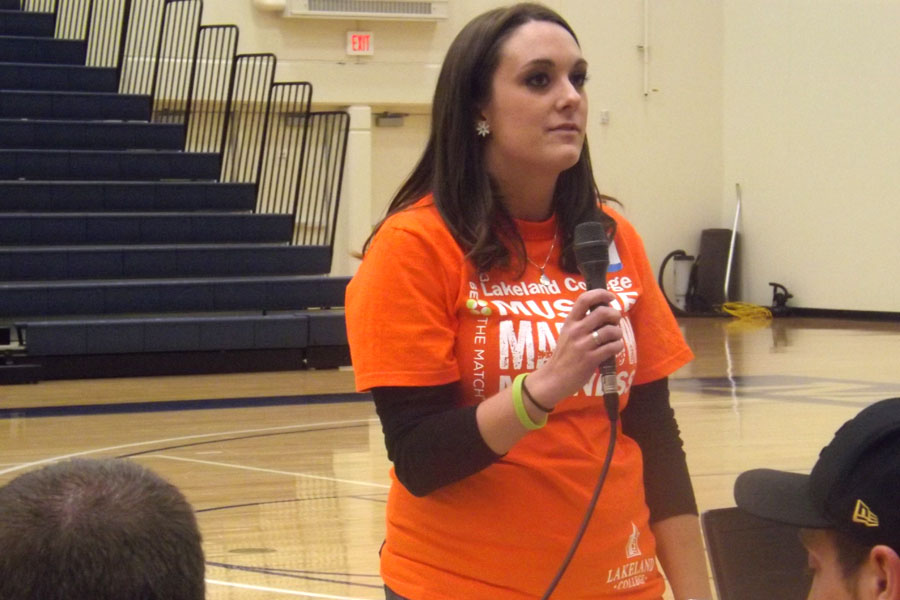Senior Business Management and Psychology major Brittany Bohm lost her boyfriend Chad Johnson, also a Lakeland student, a year ago in February to Leukemia.
“There will forever be pain in my heart from losing Chad so young. I’ll get married, I’ll move on—but Chad will always be that person, he was my first true love. He’s the person who showed me my life path. Even though times will change, I will go on—this is truly Chad’s legacy,” said Bohm.
The legacy Bohm refers to is a pair of bone marrow donation drives, hosted Jan. 19 and 29 in the Wehr Center and Bossard Hall, respectively.
The event was coordinated by Bohm and Danielle Rammer, along with the help of Kaye Martin, director of student activities, Sally Bjork, coordinator of student success, and Nate Dehne, vice president of student development. The Phi Deltas and Ladies softball team also pitched in to help man tables and encourage people to donate at the events.
Also working with Bohm to coordinate the event was Kelli Vanderwielen, a donor recruit specialist with Be The Match, a national organization that raises awareness about life-threatening diseases such as leukemia, lymphoma, and sickle cell anemia whose victims desperately need bone marrow transplants. Be The Match compiles a national database of potential donors that could be called at any time to save a life.
Before the first event on Jan. 19, Bohm, who has been on the registry herself since Nov. 2011, set a goal to recruit 126 donors between both events—but at the first event alone she signed up 141 new people to the bone marrow registry. Her goal for the second event was set a little higher. “We had a goal of 126 for the two events, and we killed it, so now I’m thinking 126 for the 29th,” said Bohm.
Be The Match does events similar to this at colleges all over Wis., and the average turnout is about 10 percent of the student population. For Lakeland, 10 percent would be around 161, which was easily surpassed on the second day of the event when 164 new students were registered, bringing the grand total to 305.
It is estimated by the Leukemia & Lymphoma Society that 1,012,533 Americans are living with blood cancer, and every ten minutes someone in the United States dies of the disease. Leukemia is also the most prevalent cancer among children.
To get an idea of how badly donors are needed, Bohm emphasizes that donors are almost never found to be matches with someone of a different race, and currently the registry is 70 percent Caucasian, ten percent Hispanic, seven percent African-American, and seven percent Asian. Chad, being Caucasian, had only five potential matches on the registry had he reached remission. This indicates the chances of receiving a transplant being of non-Caucasian ethnicity are almost non-existent.
Once a person has signed up to be a donor, there is only a one in 540 chance they will be called to actually donate. Additionally, the registry looks for donors between the ages of 18 and 44, so it is crucial that the college age group gets registered, giving them a window of as many years as possible to potentially save someone’s life.
Bohm believes that events like these are, “something schools really should do, they should be involved in community service efforts like this, especially something where you really have a chance to save lives.”
Bohm’s hope is that some group on campus will take over the event after she graduates, and solidify Muskie Marrow Madness as an annual event and a part of Lakeland College culture.
“We would like to see it become a Lakeland thing that they do annually in memory of one of their students, and Chad’s legacy will live on forever through Lakeland College,” said Bohm.
Though it is fair to say the event was a success, Bohm, who also lost her grandfather to Leukemia in February of 2010, doesn’t appear to be anywhere near done with her battle against the disease. Ultimately, Bohm says, “I would love to open some foundation for Chad. I have big dreams in my head.”
Bohm recalls the semester that she left school to be with Chad and his family in Milwaukee, where Chad had to live within five minutes of Froedtert Hospital. She remembers the immense financial pressure of an apartment that close to the hospital, school loans, and weekly pharmacy bills, topping $3,000 dollars that she described as “disgusting.”
Utilizing her business and psychology degrees, Bohm dreams of starting a foundation that could provide relief to those in similar situations, “This was meant to happen in my life, or something, to be bigger than just working in a business somewhere,” said Bohm.
Bohm is in awe of the possibility that at some point a Lakeland student could be called on to donate and save someone’s life because of the legacy Chad has left behind. “In the end, Chad might have died, [but] he’s living through other people—that’s really awesome,” said Bohm.
Bohm says, “It just makes me happy to do this in memory of Chad, and I just know that he’s healthy and cancer free. That gives me peace.”


